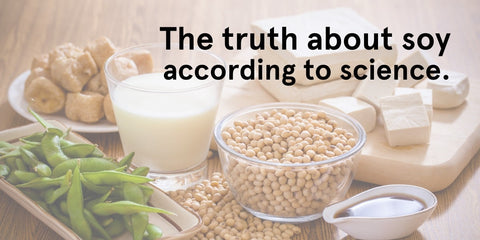We’ve taken our stance; vegan sources of protein are what we’re sticking with.
When it comes to your checklist for the ideal protein powder or shake, vegan variations often get all the boxes ticked. If you’re choosing a beverage based on protein intake, effects, benefits, and production, vegan protein drinks may be your winner too.
Why Use Protein Powder and Shakes?
Whether you use powders mixed with water or shakes, protein-filled drinks are a simple way to incorporate more protein into your diet. Protein is vital when it comes to keeping us strong and healthy. Between your organs, muscles, tissues, bones, skin, and hair, there are over 10,000 types of protein present in your physical makeup.
Protein powder is made by taking natural ingredients and concentrating their proteins into a powdered form. Protein powder is added to baked goods, savory meals, shakes, and even just straight-up water so that you can acquire enough protein to keep your body functioning optimally.
The Different Kinds of Protein Sources
Because of how many protein sources there are, there are many different protein powders and shakes to choose from. The conversation surrounding protein sources often involves call-outs to animals, but many neglect the protein that’s found in plants.

Vegan Protein Powders and Shakes
You don’t have to be an omnivore or carnivore to intake the proper amounts of protein. Vegan protein sources are plant-based yet offer just as many benefits as animal proteins.
As there are different protein-rich plants, there are different plant-based protein drinks:
- Pea-rice protein
- Hemp protein
- Chia seed protein
- Soy protein
- Plant-based blend protein
Which is the best vegan protein source? At Soylent, we’ve made our decision, and to us soy takes the cake. Trust us, early on in our journey we tried some product iterations with rice protein, but it just wasn’t the right choice in the grand scheme of things.
Soy protein comes from soybeans and makes for a great source of protein. Soy has many benefits we couldn’t pass up on (and you shouldn’t either). For starters, soy is a complete source of protein and has long-term health benefits. To top that off, soy is the most sustainable source of protein and best tasting, making our products both nutritious and delicious.

Animal Protein Powders and Shakes
Animal-based protein sources take up most of the shelf space as you cruise through the sports nutrition aisle of the supermarket, but that doesn’t mean it’s the best choice for you.
You’ll find that most animal-based protein powders and shakes are made from one of the following ingredients:
- Whey protein
- Collagen protein
- Egg protein
- Casein protein
Eggs may be the only word you associate with animals on this list, but these proteins are all derived from animals in one way or another. To learn more about the details that differentiate protein sources like whey and soy, check out our blog post on their benefits and downsides.

Vegan Protein Vs. The Others
To make an informed choice between vegan and animal protein drinks, you need to know how they differ from each other in terms of expected benefits. Below’s the breakdown of what each protein source comes with.
Protein Intake
If you’re choosing what kind of protein blend would work best for you solely based on the grams of protein to calories ratio, then the options are pretty much equal. You’ll have to shop around between different brands and how they formulate their powders and shakes.
One gram of protein is four calories. Any additional calories you see on the label are due to flavorings and additional ingredients. For example, if you’re looking for a serving of 25 grams of protein, the drink or powder you choose will have at least 100 calories in each serving.
When it comes to both vegan and animal-based protein powders and shakes, protein to calorie ratios vary by brand but typically contain 20-40 grams of protein for 110-200 calories.

Health Benefits
There are many health benefits to consuming protein in general, but a few benefits are specific to the different kinds of protein sources.
Vegan Sources
Along with providing all of the benefits that protein does in general, vegan protein is said to help reduce your risk of chronic disease and support the health of your gut.
Research shows that replacing animal protein with plant protein is associated with a reduced risk of chronic disease, linked to the consumption of more fiber and less saturated fats.
Gut health is another benefit to take into consideration. It’s said that you can optimize digestion and support your gut by rotating your sources of protein. Whether you’re a meat-eater or not, changing your protein sources and the foods you eat can help strengthen your gut.
If you’re vegan and often use tofu, chickpeas, or peanut butter as your primary source of protein, then adding a pea or soybean-based protein powder or shake to your diet can support your digestive system.
Animal Sources
Animal protein sources (more often whey protein) are mostly credited for being a better option for muscle recovery after exercise.
Although animal protein is more effective at stimulating muscle synthesis, the difference is so minimal that it should hardly be considered if you’re not a professional athlete or bodybuilder.
Sustainability
Vegan Sources
Soy protein isolate is the most sustainable option compared to both whey protein isolate and pea-rice protein in regards to their global warming contribution.
Soy protein is the only plant protein with a PDCAAS score of 1—the best possible score. This score is one of the many reasons why our Soylent team is sticking with soy out of all the vegan protein options available.
Animal Sources
Animal-based protein powders are a waste product from other industries such as meat and cheese production. Despite animal protein not having the most significant carbon footprint, it still supports meat processing and unethical farming practices, making it less sustainable than vegan options.
Vegan Protein Drinks For the Win
The superiority of vegan protein-packed drinks may not be blatantly obvious, but trust us, it’s still there.
Not only does vegan protein come with its benefits, but it matches all of those from animal-based protein drinks.
Vegan protein powders and shakes can help reduce your risk of chronic disease, digestive disruption, and contributing to unsustainable farming practices. You’re not missing out on anything that animal-based protein sources offer, as vegan options are just as effective.
Soylent: Why Do We Choose Soy Protein?
At Soylent, we use soybean protein to create our complete nutrition meals. Soylent is made using vegan ingredients for sustainable and nutritional reasons, along with soy simply tasting delicious.
When it comes to meeting our sustainable and nutritional standards, we find that vegan outweighs animal-based protein sources, and looking closer, soybeans outweigh all other vegan options.
When we examine our checklist of what an ingredient needs to make its way into our Soylent bottles and bags, soybean protein has every box checked. Our vegan complete meal drinks and powders allow allows us to provide complete and sustainable nutrition to all.






